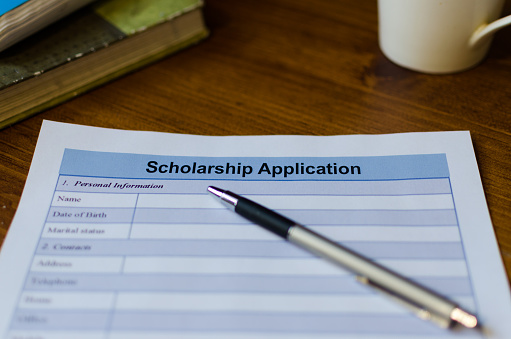How to write a scholarship application

If it weren’t for the scholarship essay, applying for scholarships would be a breeze because it requires us to think deeply about who we are as individuals and what we’ve done in our lives up to this point.
Although it has the potential to be the most challenging component of the programme, it is also the component with the most significance.
Your scholarship essay allows you to advocate for yourself and demonstrate to the selection committee why you should be awarded the scholarship.
It enables you to display your own personality and the accomplishments in the life of which you are the proudest.
Your scholarship application should include information, but your scholarship essay should convince the committee that you should get the award.
Because scholarship judges often read hundreds or even thousands of scholarship essays, differentiating your application from the other candidates is very necessary.
But how?
To your good fortune, you do not need to possess impeccable writing talents to make it happen. It won’t be difficult for you to take your scholarship application to the next level if you just keep a few scholarship essay ideas and methods in mind.
How to Write a Scholarship Essay that Will Impress the Admission Committee (helpful tips)

The Planning Phase

1. Make preparations very early on
If you put off writing your scholarship essay until the very last minute, the quality of it will probably suffer as a result.
Create a calendar listing the due dates and other criteria for each of the scholarships you want to apply for to guarantee that you will have sufficient time for the planning portion of the project.
Make sure you allow yourself plenty of time to think up ideas and check your work before submitting it!
2. Recognise Who You’re Writing To
Knowing exactly what the scholarship committee is looking for is the most effective method to satisfy their requirements and win them over as potential recipients.
Determine who their ideal candidate is and how you fit into the image they have created for themselves.
However, take caution not to give in to their demands and expectations of an excessive amount.
You should not compromise your voice or individuality to fulfil the requirements.
Instead, you should focus on your skills and then figure out how you can use those qualities to make yourself the best candidate.
3. Follow the instructions and respond to the question.
Even though it would seem to be one of the more apparent scholarship essay recommendations, many candidates make their first error before they even begin writing their scholarship essays: they don’t read the guidelines.
This is one of the most common mistakes. Because it demonstrates that you did not prepare this scholarship essay as well as other candidates, exceeding (or failing to meet) the word limit might be detrimental to your chances of being selected.
In addition, be sure that you have followed the right structure for the scholarship essay and that you have responded fully to all of the portions of the question that you have been given.
4. Pick a subject that you have a strong interest in and a lot of enthusiasm for
Your choice of subject may significantly affect how well the rest of your scholarship essay comes out.
Suppose you want your personality and enthusiasm to come through in your writing. If you choose a subject that doesn’t interest you, chances are it won’t interest your audience either. In that case, it’s best to select a subject that you’re enthusiastic about or that interests you in some manner rather than one that you feel you should write about since it will give you the best chance of success.
When you write a scholarship essay about yourself, don’t add any false details
5. Think about utilising a scholarship essay that you’ve written before.
The identical scholarship essay question is used for many different scholarship essays. Some scholarship sponsors even make use of the questions from the Common Application, while others give you the freedom to choose your own subject.
This indicates that you can just copy and paste your scholarship essay to submit it for several applications (great!).
In other instances, scholarships may pose questions or provide scholarship essay topics that are quite similar to one another and can be replied to in the same manner.
Instead of producing a whole new scholarship essay from scratch, you may try making some little adjustments to an old one instead. For example, the following two prompts often have the same appropriate response:
- Talk about a crucial time or event in your significant personal development.
- Share an experience with us where you had to triumph over a challenge.
Another prompt that looks similar include
- Why I deserve this scholarship.
- What skills do I have that make me suited for this scholarship?
If you already have the essay written for one of these topics, you can often modify it so that it responds to the other challenge as well.
This is because conquering adversity frequently leads to increased levels of personal development.
The Writing Phase

1. Develop a Powerful Opening Statement/Introduction
Because it is the section of the scholarship essay responsible for drawing in the reader and persuading them to continue reading, the introduction should be one of the most powerful aspects of the scholarship essay.
Why not grab the attention of your reader right away with a startling opening sentence rather than by providing a basic summary to begin with?
For instance, which of these two beginning lines is more effective at drawing you into the story? Which one gives you the most motivation to go on?
My first trip outside of the country was with my family to Mexico in 2010, where we spent our holiday.
It was 2010, and I had just entered Mexico. Little did I know that my life was about to take an unexpected turn.
The second phrase provides the reader with something to look for; it gets them interested in how your life changed during your vacation and why it changed. It poses questions that are left unanswered for the readers, so they have no choice but to continue reading to discover the solutions.
Think of this as the textual equivalent of a movie trailer; you want to offer the reader a sneak peek at what they may anticipate finding in your scholarship essay.
In general, you will want to give your reader a fast preview of what they can anticipate finding in your scholarship essay. What are some of the reasons why people should keep reading?
2. Maintain an Effective Structure
After the beginning, you need to ensure that your reader can easily follow up with the rest of your scholarship essay without exerting excessive effort.
Making a simple plan is an excellent way to guarantee this will occur!
Organizing your ideas is the first step in developing an outline. Take some time to jot down the most important ideas you want to discuss in your scholarship essay. After that, you should arrange those ideas into several parts, such as an introduction, a body, and a conclusion.
Your thoughts may be expressed in the form of whole sentences, phrases, or even just single words, whatever you find most convenient. Lastly, you should ensure that your thoughts flow in a logical sequence and, if further explanation is required beneath each point, bring it in.
In addition, make an effort to avoid wandering off on a tangent by carefully considering the facts at hand and deciding which pieces of data are essential and which are not. Similarly, think about how much specific information you need to offer.
Your topic may become more understandable or convincing if you include some details, but excessive information may cause your scholarship essay to get bogged down.
3. Show Emotions
When done well, connecting with an audience via writing may result in a solid connection between the reader and the author. However, this kind of connection is only possible when the writing is done correctly.
Getting the reader emotionally immersed in what they are reading and helping them connect with the content of your scholarship essay may be accomplished in several ways.
Exhibiting emotion in your writing might help the reader connect with you more personally rather than seeing you as a faceless author.
People have a terrible habit of ignoring this particular piece of advice about scholarship essays, even though it is one of the essential guidelines.
It’s important to remember that we all have weak spots, so you shouldn’t be embarrassed to display yours. Scholarship committees do not want you to be flawless; instead, they are interested in seeing how you have developed as a person and how you have dealt with the challenges that life has presented to you.
Suppose you speak up about instances when you were worried or terrified. In that case, you are demonstrating maturity and self-awareness, which are fantastic attributes to have if you apply for a scholarship.
4. Make use of examples from real life (“Show, don’t tell”).
Show your reader what you’ve been through rather than just telling them about it. Do not be hesitant to share real-world instances of the lessons you’ve learned or how you’ve developed as a person.
Your personal statement or examples are your opportunity to make your scholarship essay stand out from the crowd of other applicants’ generic responses to the scholarship essay topic, which means you should take advantage of this opportunity.
Compare the following two sections that describe the applicant’s motivations for wanting to pursue a career in science:
VERSION 1: Even when I was very little, I was always fascinated by many scientific topics. I continued to follow my passion throughout the whole of my education since my family warmly supported it. But as I’ve become older, the challenges presented by my scientific activities have become more difficult.
VERSION 2: Due to my age, I could not participate in the school’s scientific fairs; thus, I turned to my family. I conducted an experiment in which I graphed the results of force-feeding my family members several sorts of animal food and observing which ones they preferred. My family has never forgiven me for something I did when I was just six years old; my “experiments” continue to be a source of laughter among the family. Despite this, I had moved on from the days when I taste-tested dog food and am now doing investigations using DNA gel electrophoresis.
Which of these is more interesting? Even if everything is explained in Version 1, and it may be a well-written document, you have to admit that it’s not very interesting. Version 2 brings the topic to life and reveals the eccentric personality of the author.
Version 1 might have been written by anybody (and possibly quite a few candidates), but only Version 2 could have been written by Lauren. This exemplifies the effectiveness of using “show, don’t tell” in communication. It lends to her ability to stand out.
5. Always have an encouraging and upbeat attitude
One of the essential pieces of advice for writing a scholarship essay is to focus on establishing your viewpoint and tone. Nobody is interested in reading a narrative that is miserable and full of self-pity.
Even if you are writing about challenging or upsetting events that have occurred in your life, make an effort to keep the tone upbeat and motivational.
Focus on how you improved as a person due to the experience and how you overcame the challenge rather than just writing about how the incident adversely impacted you.
6. Steer Clear of Dull and Uninteresting Concluding Statements
Most individuals use the conclusion just to summarise the whole scholarship essay. However, don’t be frightened to think of something completely different!
Try to think of something unexpected and original to do. Your scholarship essay should be engaging and attention-grabbing to succeed from the first letter to the last period.
Leaving your readers with an intriguing question to ponder after you’ve presented the conclusion of your argument is a fantastic strategy for taking your conclusion to the next level.
The Editing Phase

1. Proofread and seek assistance!
It doesn’t matter how much we’d want to think that we’re flawless; the truth is that we all make errors. That’s why it’s so crucial to spend some time proofreading your scholarship essay. Reading your scholarship essay aloud is a wonderful approach to spot errors, so make sure you do it.
When you have completed the task of proofreading your own scholarship essay a few times, you should then get it proofread by another person.
The act of soliciting assistance from a member of your family or a close friend might give you a fresh viewpoint on your work, as well as the possibility that they will see an error that you missed.
2. Make the Most of the Available Resources
You don’t have to accomplish everything on your own when it comes to writing; you may get help from others.
If you are currently enrolled in college, your school most likely has a writing centre where students may go to get free critique and help and also other scholarship essay examples.
They could even have some intelligent scholarship essay suggestions that you (or we!) haven’t thought of yet that they’d be willing to share with you.
It’s possible that certain municipalities, high schools, and libraries also provide the same kinds of services.






Thanks very much
I am interested in learning scholarship and the one financing it
Hi,
Thank you for your comment!
We recommend exploring various scholarship and financial aid options that might be available to you. Our scholarship search tool can be a great resource. You can access it here: https://www.iefa.org/scholarships.
Additionally, for more comprehensive information on financial aid options, including loans and other forms of assistance, please visit our resources page here: https://www.iefa.org/international-student-loans
Remember, each scholarship or financial aid program will have its own application process and requirements, so be sure to contact the relevant organizations directly for guidance.
Best of luck with your studies, and keep pursuing your dreams!
– The IEFA Team
I need help on how to get a scholarship
Hi,
Thank you for your comment!
We recommend exploring various scholarship and financial aid options that might be available to you. Our scholarship search tool can be a great resource. You can access it here: https://www.iefa.org/scholarships.
Additionally, for more comprehensive information on financial aid options, including loans and other forms of assistance, please visit our resources page here: https://www.iefa.org/international-student-loans
Remember, each scholarship or financial aid program will have its own application process and requirements, so be sure to contact the relevant organizations directly for guidance.
Best of luck with your studies, and keep pursuing your dreams!
– The IEFA Team